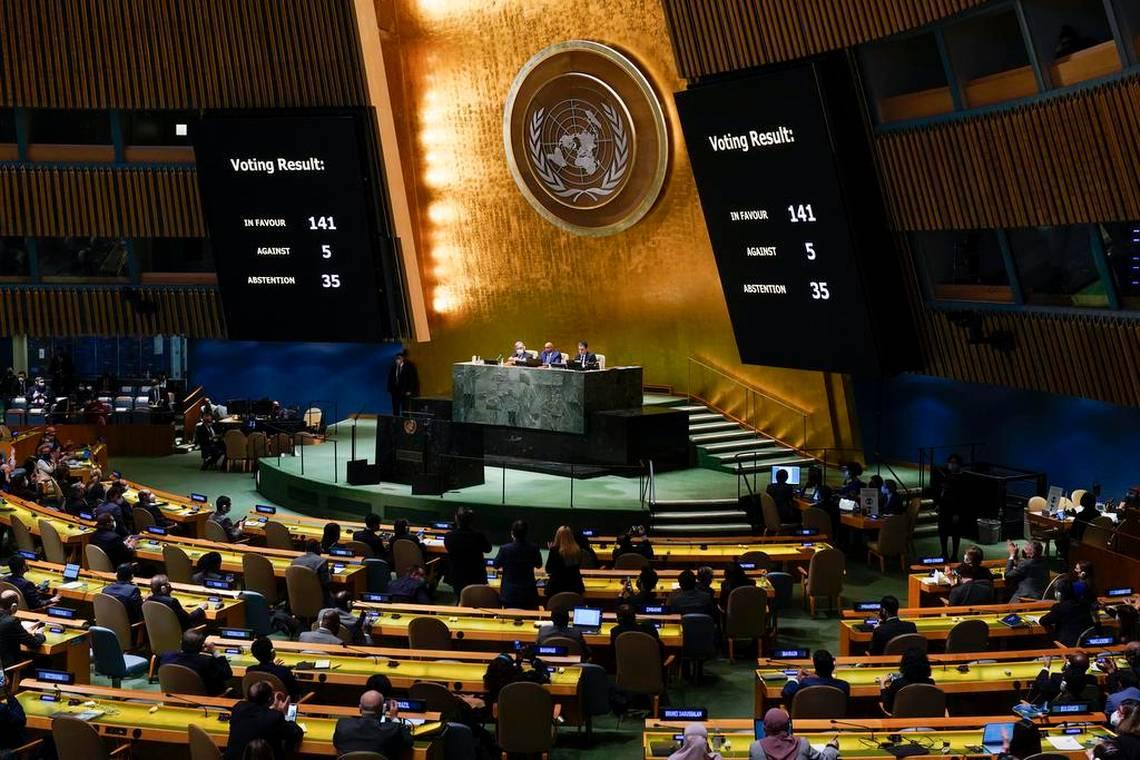
Cuba and Nicaragua voted Thursday against expelling Russia from the United Nations Human Rights Council over atrocities committed by its forces during the war in Ukraine, shifting from their previous, more cautious abstention votes to signal their open support for Moscow.
Bolivia also voted against it. But more surprisingly, two of the region’s heavyweights, Mexico and Brazil, abstained from voting, along with El Salvador, Barbados, Belize, Guyana, Saint Kitts and Nevis and Saint Vincent and the Grenadines, showing that Latin America and the Caribbean continue to be divided in their response to the war in Ukraine.
“Today it is Russia, but tomorrow it could be any of our countries, particularly nations of the south that do not bow to the interests of domination and that firmly defend their independence,” Cuba’s U.N. representative, Pedro Luis Pedroso Cuesta, said, accusing the United States of orchestrating the vote.
“Will this Assembly ever be able to pass a resolution suspending the United States’ membership in the Human Rights Council, to take just one example?” he asked. “We all know that this has not happened and will not happen, despite its flagrant and massive violations of human rights, resulting from invasions and predatory wars against sovereign states, based on their geopolitical interests.”
The resolution passed in the U.N. General Assembly with 93 votes in favor, 24 against and 58 abstentions, effectively suspending Russia’s membership in the Council.
The U.S. representative to the U.N. called the vote “a historic moment.”
“Countries from around the globe have voted to suspend Russia from the U.N. Human Rights Council for its gross and systematic violations of human rights,” U.S. Ambassador Linda Thomas-Greenfield said. “We have collectively sent a clear message that the suffering of victims and survivors will not be ignored.”
Cuba’s representative did not mention the mounting evidence of possible war crimes committed by Russian forces in Ukrainian cities like Bucha that prompted the vote, instead referring to the “death of hundreds of thousands of civilians” caused by U.S. wars.
The war in Ukraine was almost absent from his speech. Pedroso Cuesta mentioned it once to say that the suspension of Russia’s membership rights ”in no way favors the search for a peaceful, negotiated and lasting solution to the conflict in Ukraine.”
To justify its abstention, Mexico’s representative said his government favored “keeping all channels opened” to find a diplomatic solution.
“It’s disappointing but not surprising that Cuba and Nicaragua voted against the resolution and that so many other Latin American nations abstained,” said Eric Farnsworth, vice president of the Council of the Americas and Americas Society.
“At this point, after Russia’s butchery in Bucha and elsewhere has been exposed, refusing to condemn Russia for its actions in Ukraine is not just irresponsible but inhumane, no matter how close the relationship may be with Moscow,” Farnsworth said. “Such ‘active nonalignment’ threatens to decrease regional relevance in the management of global issues. It is also morally obtuse.”
Presumably, Venezuela, another Russian ally, would have also voted against suspending Russia, but Caracas lost its U.N. voting rights for non-payment of dues.
Cuba’s own seat at the Human Rights Council has been questioned over the island government’s record of human rights violations. The Center for a Free Cuba, a human rights organization based in Washington, called for Cuba “to be voted off” in a statement saluting the expulsion of Russia.
Cuba and Nicaragua, two close Russian allies, abstained in recent U.N. votes to pass resolutions condemning the war, a gesture interpreted as an effort to put some distance, at least publicly, from their countries and the actions of Russian President Vladimir Putin in Ukraine.
But since the beginning of the war, Cuban state media have been promoting the Kremlin’s disinformation campaign. On Wednesday, Cuba’s Communist Party newspaper Granma ran an article calling the massacre in Bucha, a Ukrainian city where several people were executed by Russian forces, “a fabricated lie that, because it has been repeated so much, regrettably poisons the international community against Russia.”
In another article Wednesday, Granma quoted Russian officials saying that the images and videos of Russian forces’ violence against Ukrainian civilians were fake and were filmed by paid actors.
But at the U.N. session, Thomas-Greenfield used her speech to speak of victims of the Russian invasion.
“Yesterday, I saw a photo taken by an AP photojournalist in Kyiv that has stuck with me in particular,” she said. “It’s of a 6-year-old boy, standing in a garden next to his mother’s grave. It stuck with me because, one day, Ukraine’s infrastructure will be rebuilt and the rubble will be cleared. But there will be no way to rebuild the lives that Russia has destroyed. We cannot bring back those who have perished — Ukrainian mothers, fathers, sons and daughters.”




